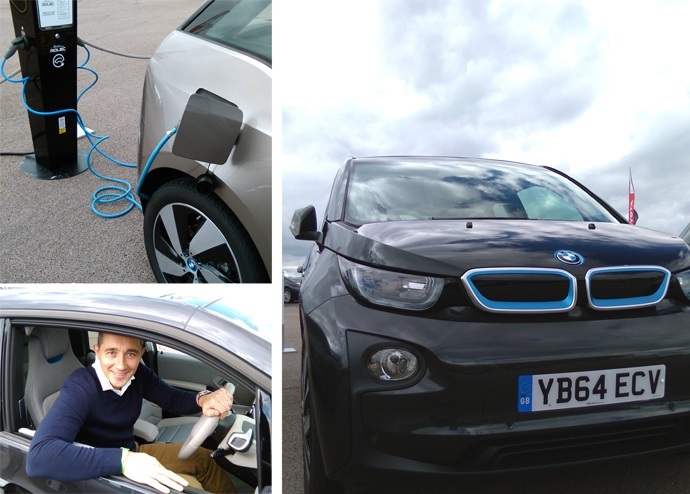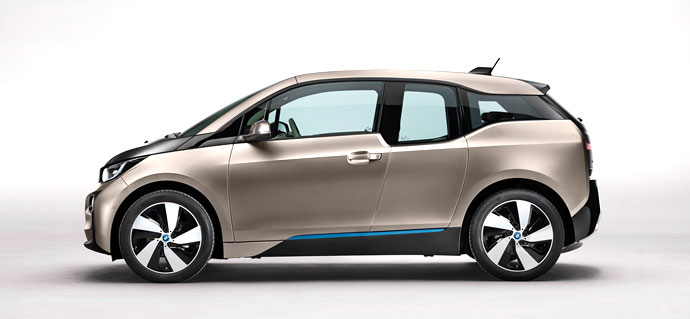
The news this week that VW has designed its diesel cars to cheat emissions testing prompted us to test the BMW i3 – the latest in electric car technology.
‘exotic runabouts for the wealthy’
Much is written about electric cars and they are often dismissed as little more than novelty vehicles; exotic runabouts for the wealthy, toys for early adopters or badges of honour for the environmentally devout. After all, there is only a tiny selection of electric vehicles (EVs) available to buy and without exception they are more expensive than their internal combustion engined equivalents and offer far less range and performance. Does driving one do anything to alter perceptions?
Two years ago, we had the chacne to test the all-electric 1 Series ActiveE. It wasn’t a car you could buy, but it felt every inch a production-quality BMW. An electric conversion of a conventional 1 Series, the car was intended to help in the development of the BMW i3.
A four-seater car with a 100-mile range, 3-hour recharge time and rear-wheel drive, the ActiveE was heavier than its petrol-powered its petrol-powered 1 Series cousin, but felt just as accomplished on the road. With the battery in place of the internal combustion engine and a 125kW equivalent to 170hp over the rear axle, the car retained all the poise for which the marque is famous.

The BMW i3
The BMW i3 is a superior driving experience in every respect. It has the brisk and seamless acceleration for which electric vehicles are known. However, it is the handling that most surprises. The BMW i3 is built as an electric car from the ground up. With a carbon fibre chasis, a low centre of gravity and equal weight distribution, the car handles like a dream.
The car accelerates briskly and the regenerative braking is powerful enough to mean you do very little slowing down with the conventional disc and pad stoppers if you drive carefully.
It makes battery-powered motoring feel like it’s just around the corner.
Electric cars are often dismissed as novelty vehicles; for most, however, a drive in the i3 will be a revelation. No other car makes widespread electric motoring feel nearer.
The fact that BMWs have a reputation as ‘drivers’ cars’ makes the reception the i3 has received from motoring journalists all the more remarkable. Many have been impressed by its levels of refinement, handling and performance.
The BMW i3 has a range of 80 – 125 miles, but is available with an optional range-extending motorcycle engine that keeps the batteries topped up if they fall below 5 per cent charge, effectively doubling the range.
At around £25,000 (including the government’s £5,000 plug-in grant), the BMW i3 is too expensive to be the electric vehicle equivalent of the Ford Model T, but it is doing much to alter perceptions. It feels like a very real glimpse of the future.
ETA breakdown cover
Established over 25 years ago, and with over 5,000 recovery trucks on call 24/7, we have a proven track record of providing efficient, reliable breakdown cover. We have been voted Britain’s most ethical insurance company by the Good Shopping Guide.
We handpick only the best local mechanics and garages around Britain to send out if you break down. We believe this way of working is efficient, environmentally friendly and helps supports local communities and economies, too.
On top of this, we offset the carbon emissions of the recovery trucks that go out to assist you, reducing the impact your breakdown has on our environment. Every breakdown policy you buy helps fund the work of our charity, the ETA Trust, which campaigns for a safer, cleaner transport future.


John soames
Great car – wish it was slightly cheaper
Tony Williams
As you probably know, in the recent car guide from “Which?” several electric cars received high ratings, and you obviously think highly of this BMW. But it certainly doesn’t change my perception.
That’s because, in my opinion, a car is something I can fill with fuel and it is then able to travel hundreds of miles. As I’m now retired I only drive about 7500 miles a year, but I can think of at least fifteen occasions in the past twelve months when a vehicle that cannot do more than about 100 miles would have been useless, and in several instances could not have got me to my destination, let alone got me back home the same day.
A range of “80 – 125 miles” is much too vague to inspire confidence. 125 miles would be better than most electric vehicles. 80 is poor. Even with the optional motorcycle engine this vehicle would leave me stranded on several trips, and away from urban areas I’m not confident of finding convenient charging points.
The Which? reports praised the handling and comfort of several vehicles, and you admire the handling of this BMW – but how relevant is that if the vehicle is only travelling short distances and most probably in an urban area?
I think we should stop talking about these devices as “cars”. They cannot do the job that most people expect a car to be able to do. “Electric vehicles”, perhaps. For a small proportion of drivers with only short journeys – in which case you could pay for a very large number of taxis for the cost of an electric vehicle – they may be suitable; but otherwise it’s misleading to pretend that they are a credible alternative to a car.
ETA
The small internal combustion engine that serves to charge the battery when it gets low boosts the car’s range to over 200 miles and can be replenished at any petrol station. This degree of autonomy is more than adequate for the vast majority of motorists.